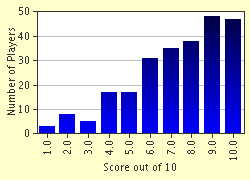Quiz Answer Key and Fun Facts
1. Yiddish primarily finds its roots in which two languages?
2. What language group is the primary origin of English?
3. While "Old English" is considered to be the language of books translated or written during the early "Middle Ages", TRUE Old English is best described as what?
4. Farsi (otherwise known as "Persian") is a(n) _______ language?
5. Which of the following languages, in its pure form, is considered a "dead" language?
6. At least six of the seven days of the week are named, in English, after the gods of what ancient tribes?
7. The U.S. used the ______ language to code certain secret information during World War II to "stump" enemy intelligence.
8. What is now the official language of China?
9. This word is derived from an old Arabic phrase meaning "hashish user".
10. Which of these languages is NOT a Norse (Northern Germanic) language?
Source: Author
the_rat_woman
This quiz was reviewed by FunTrivia editor
Beatka before going online.
Any errors found in FunTrivia content are routinely corrected through our feedback system.


